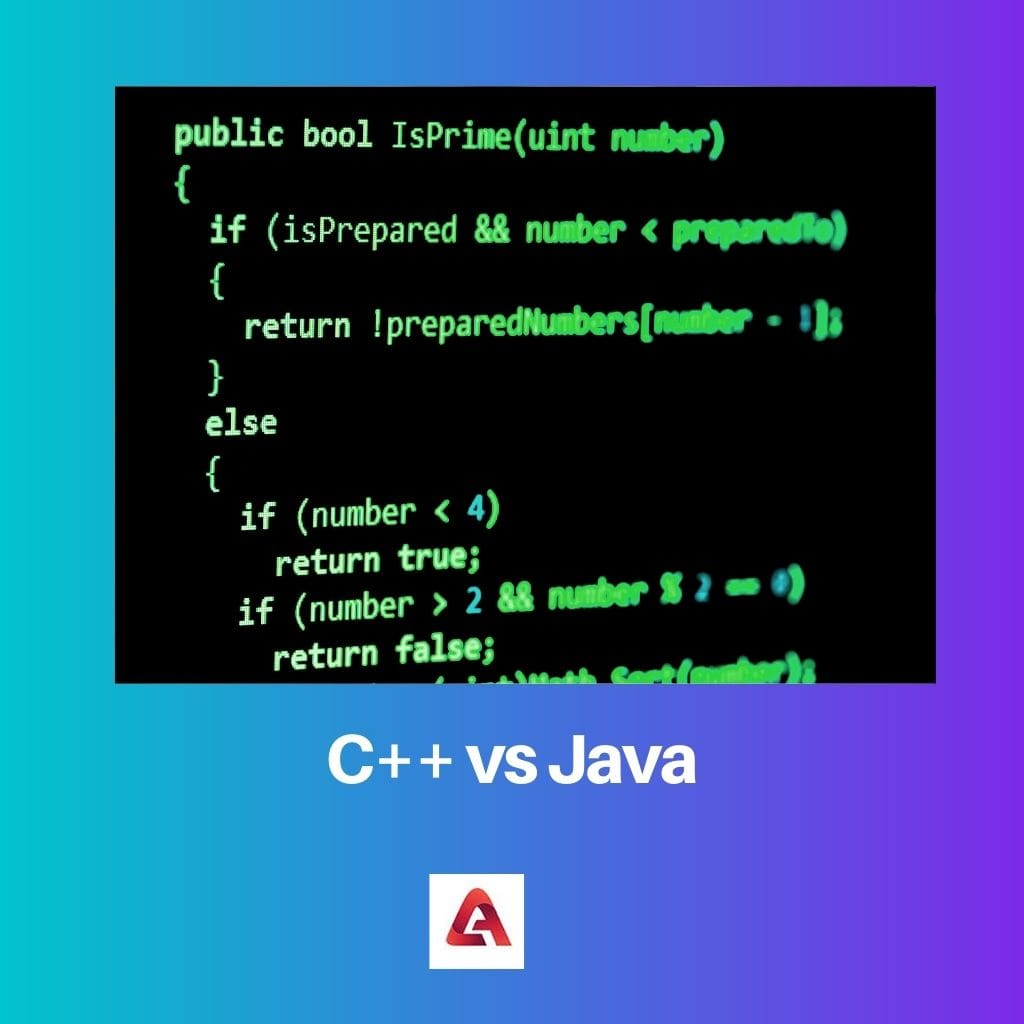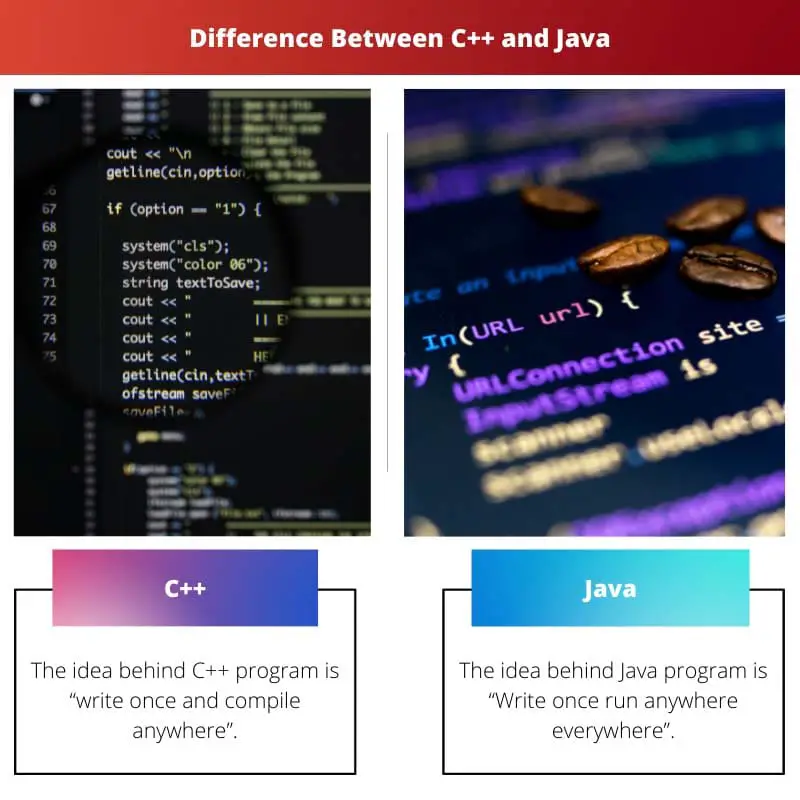Computer programming languages are programs or instructions to communicate with the computer. There are a host of languages used. However, the most common ones include C++ and Java.
C++ and Java are object-oriented programming languages (meaning data is stored in objects) but differ in multiple ways.
Key Takeaways
- C is a procedural programming language developed in the 1970s, while Java is an object-oriented programming language developed in the 1990s.
- Java includes built-in memory management and garbage collection, simplifying memory allocation and deallocation, while C requires manual memory management by the programmer.
- Java is designed for cross-platform compatibility, running on the Java Virtual Machine (JVM), whereas C code must be compiled for a specific platform to run natively.
C++ vs Java
C++ is a general-purpose, object-oriented programming language that can create low-level systems software and high-performance applications. Java is also an object-oriented programming language, but it is designed to be platform-independent, meaning the same code can run on different platforms without modification.

However, the above is not the only difference. A comparison between both the terms on certain parameters can shed light on subtle aspects:
Comparison Table
| Parameter of Comparison | C++ | Java |
|---|---|---|
| Based on the concept of | Write once compiled anywhere. | Write once, run anywhere, everywhere. |
| Type of Programming Language | A procedural and object-oriented language | Only object-oriented language |
| Type of Language | Compiled | Compiled + Interpreted |
| Dependency on platform | Platform dependent language | Not dependent on the platform |
| Other languages compatibility | Yes, with most high-level languages | Not compatible, no backward compatibility |
| Mechanism of Input | Input/output statements | More complex |
| Relationship of source code and filename | No relationship | Yes, a relationship exists |
| Interface with libraries | Allows direct calls to native system libraries | Only through Java native interface |
| Portability | Not portable | Portability is there as it can be executed on any platform |
| Is operator overloading allowed? | Yes | No, only method overloading allowed |
| Type of root hierarchy | No root hierarchy | Follows single root hierarchy |
| Access control | Flexible | Complex |
| Detection of runtime error responsibility | Responsibility of programmer | System controlled |
| Management of Memory | Manual | System-managed |
| Whether in-built thread support exists? | No, it relies on third-party libraries | Yes |
| Hardware relationship | Close to Hardware | Not much interaction with the hardware |
| Consistency between primitive and object types | Yes | No |
| Support for compiler and interpreter | Only for compiler | Both compiler and interpreter |
| Support for pointers | Provides firm support for pointers | Provides limited support |
| Virtual Keyboard support | Yes | No |
| Programming Support | Both procedural programming and object-oriented programming | Only object-oriented programming model |
| Support for structures | Yes | No |
| Suitability | System Programming, operating system, gaming applications | Application programming, web-based applications |
What is C++?
Bjarne Stroustrup of AT & T Bell Laboratories in 1979 first developed C++. C++ is an intermediate programming language (having all properties of C language, i.e., built on C) and both high and low-level language attributes.
C++ is a hybrid language as it supports procedural and object-oriented programming.
The idea behind C++ is “write once and compile anywhere.” C++ language is compatible with other high-level languages and supports various inheritances (even multiple inheritances).
Other advantages include its object-oriented feature, which enables code reusability and provides programmer control over memory management, multi-paradigm programming, exception handling, and function overloading.
C++ is not free from drawbacks. The ordinary ones include more memory consumption due to pointers, security issues, absence of built-in thread management, complexity in a high-level environment, difficulty applying to web applications, and no support for garbage collection.
C++ is mainly used in application and system development.
Other uses where C++ could ideally be deployed include well-known operating systems, digital image processing, 3D graphics, real-time arithmetical simulations, cloud storage, programming telephone switches, and even core-banking application systems.

What is Java?
Java is a multi-purpose, high level and advanced programming language developed in 1991 by Sun Microsystems. Java was initially called OAK but later renamed Java in 1995 to take benefit of the world wide web.
The idea behind the Java language is “Write once, run anywhere, everywhere.” This concept is possible in reality as byte code generated by the Java compiler is independent of the platform and can run on any machine.
Java is an object-oriented language with advanced attributes. Java can run on most systems as Java virtual machines exist for multiple systems.
Java offers several advantages that make the language suitable for web use. Some applications/websites may not even be open or work unless Java is installed.
Java is not free from drawbacks. Java only supports single inheritance though effects of multiple inheritances can be achieved using interfaces.
Other drawbacks of Java include non-compatibility with other languages, more memory consumption, programs taking a long time to run, and increased hardware cost.
Java is mainly used for application programming and is the most preferred language in the software industry. Also, Java is utilized for developing web content.
Java is present on the majority of mobile phones. Other areas of application include business applications, cloud computing, enterprise applications, animation, and gaming. Java is the future of artificial intelligence(AI) and big data.

Main Differences Between C++ and Java
- C++ is a procedural, object-oriented programming language that does not follow a specific root hierarchy. Java is an object-oriented programming language having a single root hierarchy.
- C++ is based on “Write once, compile anywhere” and is compatible with most other high-level languages. Java is based on “Write once, run anywhere, everywhere” but is incompatible with other languages.
- C++ is faster but harder to program. Java is more compact.
- C++ only uses a compiler. Java uses both a compiler and an interpreter.
- C++ supports operator overloading and multiple inheritances and has support for pointers. Java does not support operator overloading, multiple inheritances, and pointers.
- C++ does not provide built-in support for the internet and is not portable. Java has built-in support for the internet, and the byte code is portable and executable on any platform.

- https://pdfs.semanticscholar.org/ee70/65c3970b4c27d9d4bfa57ab45ba545481232.pdf
- https://www.computer.org/csdl/mags/co/2012/10/mco2012100088.pdf

As a developer, I find the thorough exploration of C++ and Java quite valuable. The article eloquently captures the nuanced differences and practical considerations for using each language in software development.
Absolutely, the article adds clarity to the decision-making process in language selection for distinct programming requirements.
The detailed comparison table and explanation of language features are commendable. It aids in making well-informed choices about language use in different projects.
The article presents a well-structured and detailed comparison of C++ and Java, effectively conveying the advantages and drawbacks of both languages. It’s an excellent resource for developers and software engineers seeking clarity on language selection.
I appreciate the emphasis on practical aspects and specific applications. It adds depth to the understanding of the differences between C++ and Java.
The article’s comprehensive analysis of C++ and Java’s distinctive attributes and applications offers valuable insights to the programming community. It effectively addresses the complex considerations in language selection for software projects.
Indeed, the detailed comparison serves as a practical guide for developers to approach language selection with a comprehensive understanding of their differences.
The article is a comprehensive resource for both beginner and experienced programmers, offering an insightful contrast between C++ and Java. It highlights the importance of understanding the specific requirements of a software project.
I found the explanation of their applications quite useful. It’s crucial to consider whether a language aligns with the project’s purpose and compatibility.
Absolutely, having a clear understanding of the differences between programming languages is essential for effective software development.
The thorough comparison table provides an in-depth understanding of the differences between C++ and Java, and the comments on their respective applications further enrich the content.
Indeed, the article presents a clear and well-organized analysis of the two languages.
I appreciate the emphasis on practicality and specific use cases for each programming language. It’s essential to consider these factors when choosing between the two.
This article provides a comprehensive comparison of C++ and Java, shedding light on the differences in programming languages and their respective advantages and purposes. It’s a valuable resource for anyone interested in understanding the distinctions between them.
I agree, the detailed comparison is extremely informative for programmers and developers.
The article provides an intellectually stimulating evaluation of C++ and Java, offering informative perspectives on language features and applications. It’s a commendable piece for software professionals seeking a deeper understanding of programming languages.
I concur with your assessment. The article presents an in-depth comparison of C++ and Java, highlighting their diverse utilities in software development.
While C++ has its advantages, Java’s platform-independence and integrated memory management make it a more practical choice for various applications. The article effectively captures this distinction.
I see your point, but C++ also serves a specific purpose in system development and low-level software applications.
Agreed, both languages have their strengths and should be used based on the specific requirements of a project.
The article effectively outlines the advantages and drawbacks of C++ and Java, providing valuable insights for developers and software engineers. It’s a commendable piece of content.
Absolutely, the detailed comparison helps in making informed decisions about language selection for various projects.
The article’s in-depth analysis of C++ and Java, along with their practical uses, makes it a valuable reference for those seeking a nuanced understanding of programming languages. It’s an enlightening read for developers.
I found the explanation of language suitability for different types of applications very informative. It offers valuable guidance for language selection in projects.
The comparison table and applications for both languages are particularly insightful. It clarifies the distinct utilities of C++ and Java.